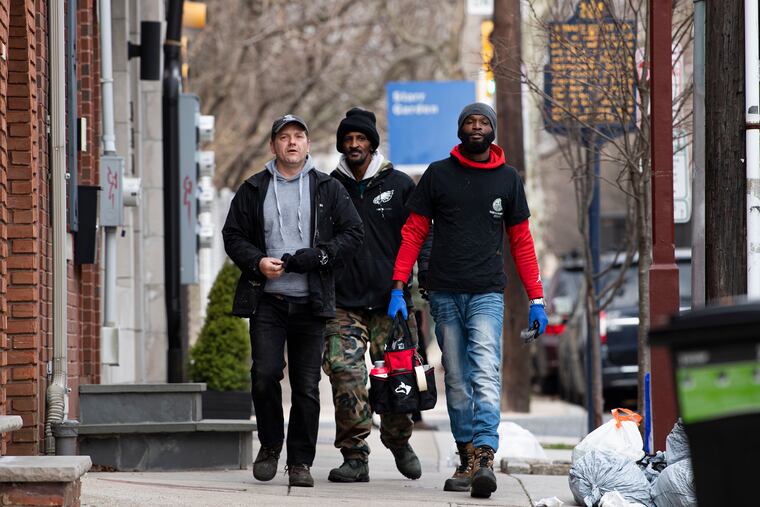Graffiti-removal company hires only homeless or formerly incarcerated workers
“When I was on the street, people treated me like I was non-existent,” recalled one formerly homeless employee. “Now, they are very appreciative and grateful.”

Todd Kelley has always had a thing for keeping his neighborhood clean. As a child, he helped his dad, George, clean up graffiti near their Wynnewood home. They did the same when they moved to Society Hill — George in 2006, and Todd in 2011. It felt like their civic duty to paint over graffiti and scrape stickers off of signs, trash bins, and other community property.
“I’ve always had an appreciation for cleaning up blight,” said Kelley, 46. “I developed a passion for it.”
In 2012, Kelley, a U.S. Army veteran, was working as a housepainter and waiting to hear whether his application for a job as an Army general’s aide would be accepted. But the employment process kept dragging on. So he decided to turn his passion for community cleanup into profit and approached the folks at the Society Hill Civic Association about keeping the neighborhood clean for a fee. They said yes.
Armed with a four-foot ladder, assorted janitorial supplies, and his own elbow grease, Kelley dove in, soon expanding his services into other Philly neighborhoods. In January 2013, he officially launched Pennsport-based Graffiti Removal Experts. Clad in neon yellow vests or T-shirts with the company’s logo, Kelley and his team — who call themselves Ninjas — clean up graffiti, remove stickers, and restore broken glass throughout Center City and surrounding communities.
Early on, Kelley was struck by how often homeless people would approach him, asking for work. When he finally had enough business to need help, he offered one of them a job — and an invitation to crash on his living room couch.
» READ MORE: Princeton adds portraits of blue-collar workers alongside those of college presidents and deans
» READ MORE: Subaru is creating furniture from recycled coffee pods and candy wrappers
» READ MORE: This Philadelphia Orchestra star shines onstage — and helps Philly school kids shine, too.
“A year later, he was able to move out, and finally got a place of his own,” said Kelley. “He got back together with his girlfriend and now has a family.”
His success inspired Kelley to establish a unique employment policy: He hires only those who are homeless or have been previously incarcerated.
“They were once spat upon on the sidewalk, and now they’re thanked,” he said proudly.
Just ask Ashley Hutchinson. For 15 years, she battled a heroin addiction and homelessness until getting sober in 2013. But she struggled to find an employer willing to take a chance on her, given her past. Then she met Kelley, who hired her last October. Finally, she feels optimistic about her future.
“The one thing I lacked in my teen years and through my 20s was any type of work ethic,” said Hutchinson, 39, who manages scheduling and other employee matters. “Now I understand you have to work hard for the things you want. I actually see a change in how the city is looking, and I feel a part of making that change.”
Hutchinson loves meeting new people and discovering hidden nooks and crannies throughout the city. “When I was on the street, people treated me like I was nonexistent,” she recalled. “Now, they are very appreciative and grateful.”
Kelley’s 11 employees — three in management and eight on the front lines — work as many hours as they want per week and earn at least $20 per hour (plus support, from one of Kelley’s professional contacts, with any legal issues they may have).
Among his clients are the Center City District, neighborhood associations, property managers, and individual businesses and residents who have contributed nicely to the Graffiti Removal Experts’ bottom line: In 2013, the company grossed $30,000, Kelley said; last year, it hit $265,000. Many clients pay him a monthly fee; for single jobs, like cleaning graffiti off a home or garage door, one-time fees typically range from $150 to $500.
Kelley has made fans of clients, like Michael Harris, executive director of the South Street Headhouse District, who began working with Graffiti Removal Experts in the spring of 2013.
“Todd’s been very reliable and consistent and is committed to his profession,” said Harris. “He helps us identify what needs to be addressed and sends us before and after pictures of the work he does.
"Our job is to try to keep the streets and the district clean and appealing to businesses, patrons and visitors, to make it an economically viable area. We try to get the graffiti off as quickly as possible to stop it from compounding.”
To that end, Kelley’s workers act on tips from residents in the areas the company services, in addition to scanning the streets several times each week.
Scraping stickers off newspaper boxes may seem like mundane work, but interesting recent jobs have included repelling down the side of a high-rise at 17th and Sansom Streets to erase graffiti, and getting rid of the paint-footprints that a shoe company stamped throughout the city without approval.
The one downside of his job, said Kelley, is removing graffiti that he considers to be art.
“Those who have skill or talent should be allowed to show it in public spaces,” said Kelley, who has been impressed with how the city’s Mural Arts Program has turned graffiti vandals into revered public artists. “They just need to get permission.”
The Philadelphia Inquirer is one of 21 news organizations producing Broke in Philly, a collaborative reporting project on solutions to poverty and the city’s push toward economic justice. See all of our reporting at brokeinphilly.org.